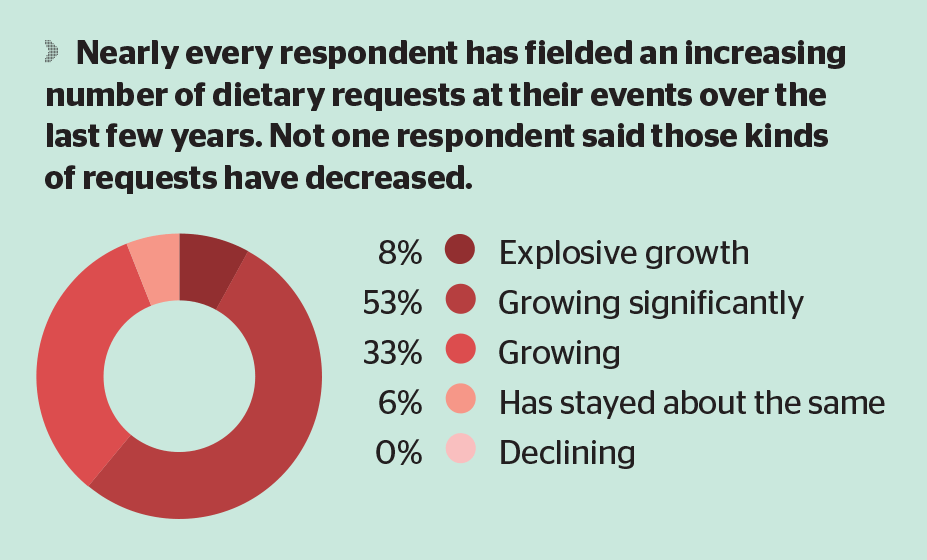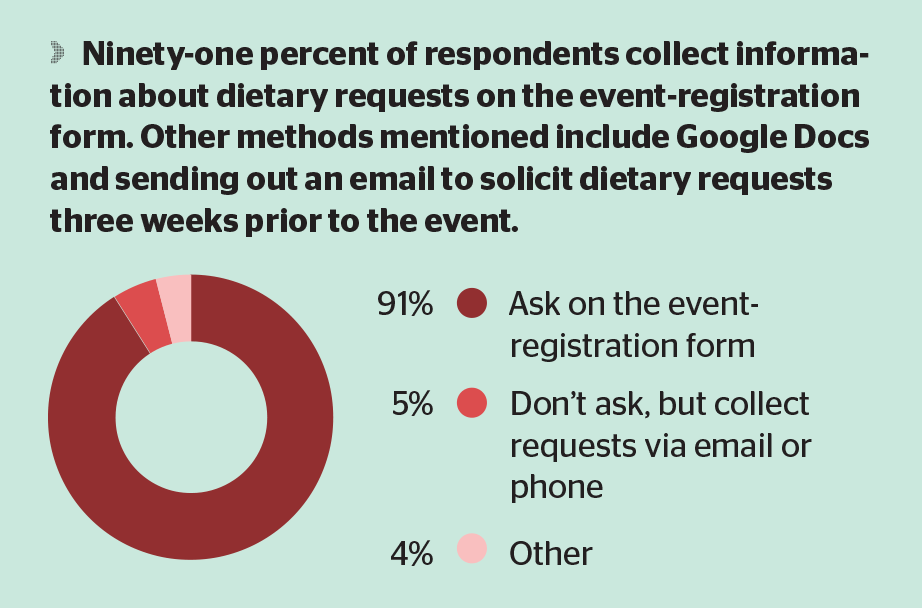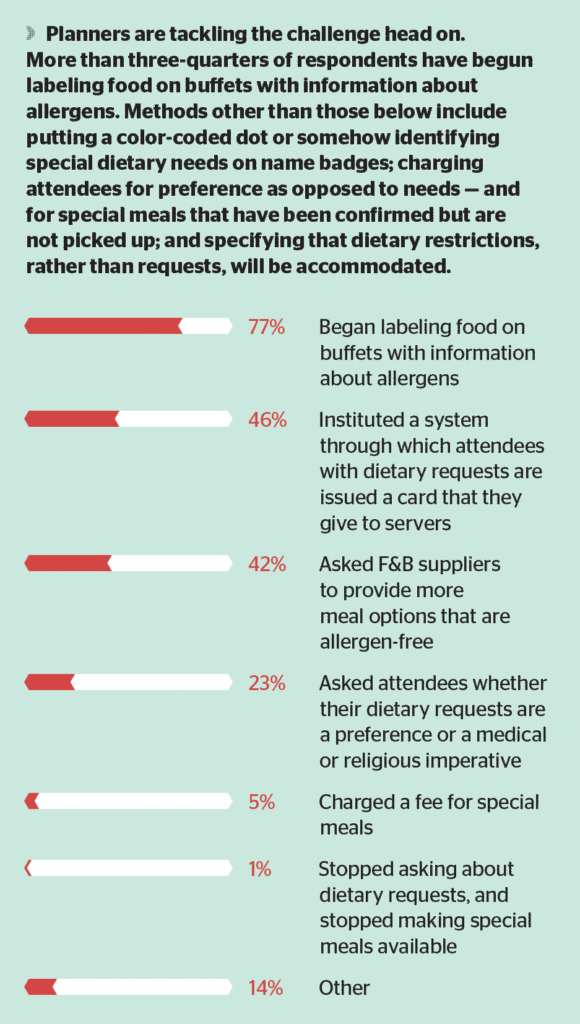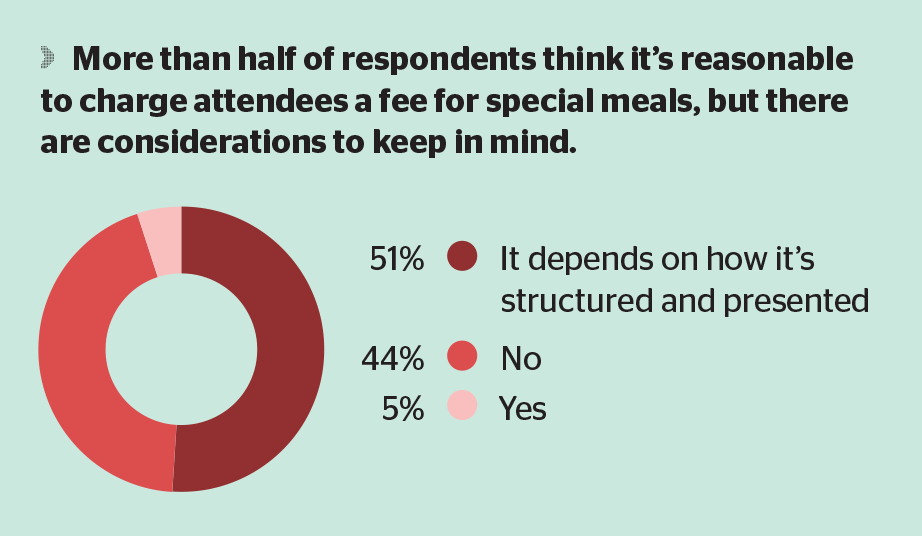For the last 12 of his 19 years as a chef, Andrew Strader has worked as executive chef for Sodexo at the Beckman Center of the National Academies of Sciences and Engineering in Irvine, California. When it comes to special requests, Strader has pretty much seen it all — and since the National Academies helps write national food policy, Strader “almost always has a healthy food option” for guests, he said.

Chef Andy Strader
Even so, when he sat down to prepare menus for an upcoming meeting held last month, the list of special-meal requests gave him pause. Out of 271 attendees, he needed to accommodate 37 vegetarians, three vegans, one person with celiac disease, three gluten-free diners, two people with dairy allergies, as well as people with shellfish, high-fructose-corn-syrup, nut and soy, and mango allergies. In addition, one attendee required kosher meals, another ate “no raw fish, undercooked eggs, meats, or unpasteurized cheeses,” another “no seafood,” and still another avoided walnuts and avocados.
While initially taken aback, Strader set about putting together a menu plan that met everyone’s needs. “At the end of the day,” he said, “it’s all about the customer.”
Strader’s catalogue of special food requests probably comes as little surprise to planners. According to Convene’s latest survey, surging dietary requests among attendees are taking up more time and costing more money — as well as creating more angst — than ever before. Of the 230 meeting professionals who participated in the survey, 86 percent said that dietary requests are “growing” or “growing significantly,” while 8 percent categorized the growth as “explosive.”
Those requests can go far beyond vegetarian, kosher, diabetic, or other health- and religious-based restrictions that planners frequently see, requiring them to learn a new vernacular — one that includes such terms as paleo and SIBO, as well as every type of -arian imaginable, from pescatarians to lacto-ovo-vegetarians.
3 Tips to Accommodate Food Sensitivities
“This is a growing issue. About one-third of our attendees request special meals,” one survey respondent wrote. “The gluten-free issue has seriously exploded,” said another. One planner may have summed it up for many: “I’m happy to accommodate, but one meeting I worked had a list of 30-plus people with requests and some were clearly preferences, not allergies or religious restrictions. I worried if we eliminated everything on the list, there’d be nothing left to serve.”
Cristen Kelly, CMP, associate program officer for the National Academies Keck Futures Initiative — and a planner who often works with Strader — also sees attendees’ food requests as “becoming more complex,” especially among her unusually health-conscious audience. Since she is allergic to artificial sweeteners, Kelly is sympathetic to people who need to avoid certain foods — but still frets over how to navigate dietary restrictions without breaking the bank or diverting too much of her time. “We’re having trouble finding the balance of being too accommodating, not accommodating enough,” she said, “and not getting ourselves in legal trouble.”
How can meeting professionals stay sane, solvent, and on the right side of the law in the new Wild West of F&B? Convene spoke with planners and chefs who offer a solid recipe for success.
The Allergen Minefield
Although the reasons are murky, food allergies are definitely becoming more common. Roughly 15 million Americans have them, according to the advocacy group Food Allergy Research & Education — and among children alone they increased roughly 50 percent between 1997 and 2011. Eight food groups cause about 95 percent of food allergies: cow’s milk, eggs, fish and shellfish, peanuts, tree nuts, soy, wheat, and certain fruits and vegetables — namely, kiwi, peaches, and celery. Then there are the lesser-known allergies — for instance, some people are allergic to vitamin K, which is found in soy, cereal grains, and cabbage.
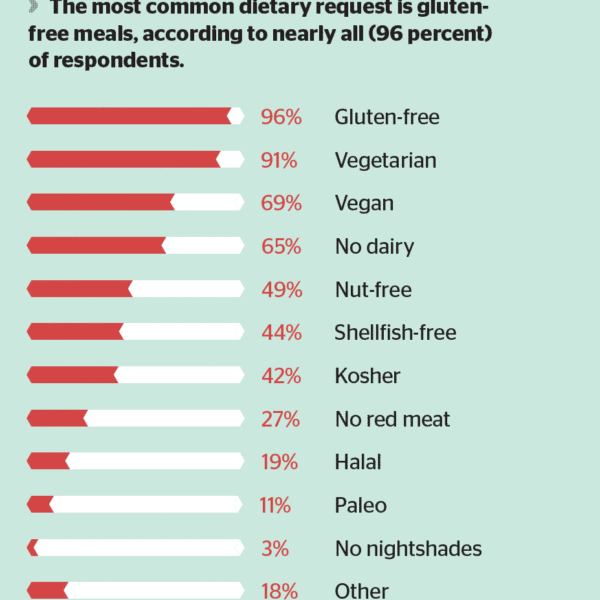 “I see adults who suddenly develop a food allergy to something they ate all their life,” said Vandana Sheth, a registered dietician nutritionist and spokesperson for the Academy of Nutrition and Dietetics. “The task for conference and meeting planners is getting harder.”
“I see adults who suddenly develop a food allergy to something they ate all their life,” said Vandana Sheth, a registered dietician nutritionist and spokesperson for the Academy of Nutrition and Dietetics. “The task for conference and meeting planners is getting harder.”
Also, 7 percent of Americans identify as vegetarian, a number that is expected to grow in coming years. In Canada, India, parts of Asia, and many European countries, the percentage of meatless eaters is higher. In addition, two-thirds of all adults worldwide are lactose intolerant, including 30 to 50 million people in the United States, according to the U.S. National Library of Medicine. Then there is the fact that one-third of Americans are trying to cut back on or avoid gluten, according to the consumer-survey firm NPD Group.
No wonder menu planning has become more challenging. Sheth, a vegetarian, thinks many people are also being more adaptable and experimental with their food preferences, from paleo eaters who swear off carbohydrates to those who identify as pescatarians, fruitarians, or even flexitarians (who only occasionally eat meat). “People are trying to cut back on the animal protein, not actually going vegan or vegetarian, but looking for more meatless options,” Sheth said. “If you have different options on the menu, even though you’ve not considered [certain attendees] to be vegan or vegetarian, they might end up choosing that food choice because it sounds more fun and it’s part of their flexitarian attitude to eating.”
Stephanie Robinson, governance coordinator and executive administrative assistant for the Wayne, Pennsylvania–based Clinical & Laboratory Standards Institute, not only gets more vegan, halal, and kosher requests during registration, but finds more attendees noting that they are on “special diets that I can’t even pronounce,” she said, “and have to actually google to find out what they are.”

Stephanie Robinson (from left), Tracy Stuckrath, and Sharmagne Taylor
The fact is, some people need to eat a certain way, while others simply want to eat a certain way — and that can be a source of frustration for planners, especially when attendees who request costly special meals don’t end up eating them. Seventy-one percent of survey respondents said that they’ve had attendees request special meals that they don’t pick up.
One week before a long-planned meeting took place, an attendee told Kelly about her adherence to the SIBO diet — to treat or manage small intestinal bacterial overgrowth — and enclosed a sheet delineating what she could and could not eat. “How on earth could I accommodate this one week out?” Kelly said. Even so, she worked with the restaurant staff to create a special meal — only to have that costly plate go uncollected.
“That was a little frustrating,” Kelly said, adding that it happens at most meals. “We usually have like five [meals] that don’t get picked up. [Attendees] say, ‘Oh, I forgot,’ or, ‘I found things [I could eat] on the line.’”
Sharmagne Taylor, CMP, president of Houston-based On-Site Partners, theorized that attendees see other attendees being served an entrée that looks appetizing, and “all of a sudden,” she said, they’re “not so concerned about [their] special meal unless it is a dietary restriction for health reasons.”
Keeping It Legal
Diners who try to pass off food preferences as allergies also make it hard for planners to follow the law. In the United States, the Americans With Disabilities Act (ADA) Amendments Act of 2008 cites food allergies as protected disabilities under federal law. In most situations and venues, meeting planners need to provide fair and 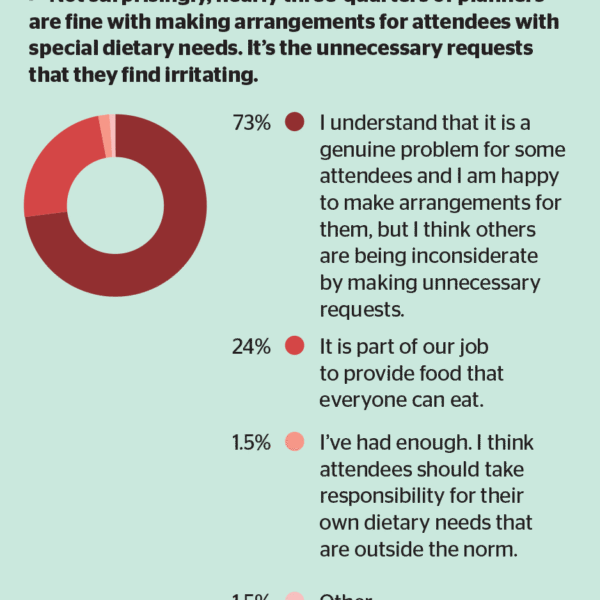 equal accommodation (meals) to people with allergies, much in the way they might provide wheelchair access — as long as the accommodation doesn’t present an undue burden, such as exorbitant cost. In 2014, the European Union began requiring labeling of 14 food allergens — and some U.S. states and municipalities have their own rules.
equal accommodation (meals) to people with allergies, much in the way they might provide wheelchair access — as long as the accommodation doesn’t present an undue burden, such as exorbitant cost. In 2014, the European Union began requiring labeling of 14 food allergens — and some U.S. states and municipalities have their own rules.
“One of the biggest challenges that planners have is, how do you know if it’s the preference or an allergy?” said Tracy Stuckrath, CSEP, CMM, CHC, founder of Thrive! Meetings and Events. Stuckrath, who often speaks on F&B compliance, now advises planners “to ask the question, ‘Do you have an ADA disability that we need to be aware of when you come to our event?’”
Compliance and accommodation can get costly. Taylor often works with diverse groups from the insurance and business-development sectors, one of whose recent meetings brought attendees from 134 countries. During her 18 years of planning meetings, she has seen meal costs rise in tandem with multiplying requests. “[Venues] are now charging way more for special meals, particularly halal and kosher, than they did in previous years,” Taylor said. “If I have a $55 entrée for a chicken, then I ask for 10 halal [meals], they’re going to charge me $98 each for them.”
That rankles Taylor. “Convention centers are saying, ‘We’re in the hospitality business,’ but they’re penalizing meeting planners and organizations for taking care of attendees,” she said. “I actually am more frustrated on that side than I am with the attendees. Attendees can’t help what they’re allergic to.”
With hotels and other venues digging in their heels on food costs, should planners pass surcharges on to attendees for special meals?Taylor thinks so — not only to recoup costs, but for strategic reasons. “We use the surcharges as an incentive for [attendees] to make sure that if they’re going to ask for those meals, then they’re going to be consumed,” Taylor said. “So far, I haven’t had to charge it back to anyone. I’ve just had some conversations with [attendees] along the lines of, ‘At the last four meals, you ordered six halals, and all six of them are still in the kitchen.’”
Speaking of the Kitchen
Chef Strader knows that many of the special-meal requests he gets are actually preferences. “Those people that are really allergic, they’ll come knocking at your door,” he said. “They generally ask for the chef. I take [allergies] very seriously here. It seems kind of complicated, but it’s not. We’re all about service.”
That said, he admitted that the evolving needs of diners have meant higher costs, which get passed on to clients. For instance, to feed increasing numbers of gluten-free and vegetarian diners, Strader now relies on costlier alternatives such as quinoa and polenta (corn), as well as vegetables like portobello mushrooms. “We make lot of vegetable ragús and hearty stuff, such as roasted root vegetables,” he said. “I can’t think of a vegetable I haven’t roasted yet.”
A Better Way to Serve Special Meal Requests
Christopher Benge, chef du cuisine for Aventura Catering at the Phoenix Convention Center, sees special requests as challenges — for example, to “come up with creative ways to substitute vegetables and still have an elegant plate,” he said. Three years ago, recognizing the growing number of gluten-free requests, the center’s team began thickening sauces with xanthan gum and agar powder instead of flour, as well as sourcing gluten-free pasta. Today, the center’s food is 85-percent gluten-free. “When they first started trying to figure out how to glue this stuff together, it tasted like cardboard to me,” Benge said. “Now, [gluten-free cuisine] is starting to come around.”
Like planners, chefs are inventing their own tried-and-true strategies to meet rising special requests. After sorting through the restrictions for his August meeting, Strader came up with a menu he hoped would meet the needs of the entire group: “A Caesar salad, a fruit salad, a rotisserie chicken with a grilled pineapple relish. Then a chipotle quinoa with corn, and tri-colored potatoes, and a vegetable medley. The quinoa is fairly hearty, so a lot of vegetarians will load up on that, and get excited about it.”
Sheth wishes she found Strader’s creative menus everywhere — but knows from experience that people with food restrictions don’t often get a meal as tasty as the traditional fare. “When I categorize my choice as a vegetarian, I end up getting a meal that might be pretty refined, because [the kitchen] is trying to make [just] one option for the gluten-free, vegans, just everyone” who has a restriction, she said. “That might not be really nutritionally satisfying. I’d have no protein.”
Spelling It Out

Chef Christopher Benge
For chefs, early communication is key. “If [special-request] information gets to me quicker,” Benge said, “even a week earlier than anything else, then that helps me.” It becomes a problem when the number of people who need special meals goes up close to the event, and then “there’s another 10 people that have dietary requirements, and then we’re making stuff the day before, rather than three days out.”
To help smooth things out in the kitchen — and keep unnecessary expenses at bay — some planners are weeding out preferences versus requirements early in the registration process. “This last event I did in June, out of 1,400 attendees, I had 293 special-meal requests,” Taylor said. She relies on spreadsheets to sort those requests — and asks attendees from the get-go to be clear about needs versus preferences. “A lot of [planners] will leave it open-ended. I don’t. I put specifically, ‘Allergic to shellfish. Allergic to nuts,’ and then from there, I’m able to plan and sort. I try to make the meal-ordering process easy, for the hotel and the convention center, to come up with something that everybody’s going to be happy with.”
If she can’t accommodate an attendee’s request, Taylor says so point blank. “I send back to the guest what it is that they’re going to be served,” she said, “and how we can accommodate them, and how we can’t.”
Robinson has also begun asking specifically about allergies during registration, and ignoring preferences. “In an effort to cut down on the more benign requests, like ‘no carbs’ and ‘no gluten,’ we changed the way we ask for the information, and we just have them let us know about any life-threatening food allergies,” Robinson said. “This way, the person who’s allergic to kiwi should just stay away from the kiwi. I went from, say, 27 food ‘allergies’ down to maybe 10.”
To reduce the number of kosher meals that don’t get picked up, Kelly contacts her kosher attendees to find out if they can eat the vegetarian option. “Most of them don’t find it offensive to ask” whether they require kosher-certified, she said, or if a vegetarian meal is okay.
Catering to Attendees’ Religious-Based F&B Requests
Once on site, planners have varying strategies for handling special eaters and meals, from adding colored dots to attendee badges, to offering meal cards that can be handed to servers. Taylor employs some clever menu planning, too, especially during plated meals, to ensure everyone finds something to eat and that special meal requests come out on time. “For the events with the most attendees, I choose the least objectionable entrée, and then I work backwards from there,” she said. She often relies on a frequent standby. “If I go with chicken, then all I have to do is serve a chicken meal and a vegetarian meal. I always offer a vegan entrée for large meals, even if I can’t do a vegan first and last course. We don’t want our vegetarians to be waiting until everybody else has been served — we want simultaneous service.”
On buffets, labeling allergens — or the absence of allergens — has become the norm. “We put cards on there that say that it’s gluten-free or it’s dairy-free, nut-free,” Benge said.
Stuckrath, who’s allergic to yeast, thinks these kinds of labels aren’t enough; she’d rather be told what’s in a dish than what’s not. “What a dish doesn’t contain does not help me,” she said, citing EU labeling laws to back her idea up. “When you tell someone what it contains, you’re providing a lot more information.”
No matter how hard a planner tries to avoid an incident, meals can occasionally go wrong. Labels on the prepackaged foods that chefs use may not be accurate, or formulations can change, or cross-contamination occurs. When attendees with an allergy inadvertently eat something dangerous to their health, planners need to be ready with a risk-management plan to treat anaphylactic shock — epinephrine, antihistamines, and a familiarity with nearby medical resources.
While a life-threatening allergic reaction is a frightening prospect, Taylor tries to keep things in perspective. “My job is to take care of the attendee, and I take that job very seriously,” she said. “Be patient. It is our job — when people come into our conventions, our meetings, and our events — to take care of them, not to consider them a problem or a difficulty, but to treat them as you would guests in your home. It just takes a little bit of creativity, and we have the tools of technology to make it happen. Just keep a big-picture attitude.”
These stories were originally published online Aug. 31, 2016, and appeared in the September 2016 Convene magazine edition.
If You Like Us, Put a Label on It
For me — someone who follows a gluten-free diet for medical reasons — one of the most heartening results of our recent survey was that 77 percent of respondents have begun labeling buffet food items.
I know that’s not as easy as it sounds, either for catering staffs or meeting organizers. It adds another layer of work, and leaves open the possibility for mistakes. But I can think of no other tweak a planner could make — beyond being willing to make accommodations for special dietary requests — that has the potential to relieve more stress, or inspire more gratitude, among those of us who can’t eat certain foods without getting sick.
Here are three things that labels do for me:
Labels allow me to be confident about what I am eating. It can be a minefield out there. There are dozens, if not hundreds, of ways for those of us who have avoided gluten for years to get tripped up: Tortilla chips are often gluten-free, but some brands are dusted with wheat flour. More brands of yogurt are gluten-free now than in the past, but there are exceptions. Grilled meat and poultry are sometimes marinated in gluten-laced soy sauce, and cold cuts and sausages may contain gluten by way of additives. You can’t tell just by looking at a food whether it is gluten-free — unless, of course, that item is labeled.
Labels help me be present. Sharing a meal is about more than just consuming calories to keep our bodies going — meals are a social event. I don’t want to spend that time worrying about my own boring food issues, or bottlenecking the buffet line by quizzing busy servers about ingredients. I want to give my full attention to those I’m dining with.
Labels help me not waste food. I hate missing out on all the yummy-looking foods that contain gluten. But missing out on yummy-looking food that is gluten-free because I didn’t know it was safe to eat? That breaks my heart. By taking away the uncertainty, I’m able to eat with confidence. And did I mention gratitude?
— Barbara Palmer
A Modest Proposal for Surcharges
Almost half of those who responded to our survey about dietary restrictions said no to surcharges for attendees who ask for special meals. A few, 5 percent, said yes — and another 51 percent said that it depends on how those requests are structured and presented.
There’s lot to chew on in this question. As a person who lives with food restrictions, I’m aware that it can be expensive, and more than a little inconvenient, to accommodate them. Survey respondents agreed: When asked to identify the biggest challenges when accommodating dietary requests, 38 percent of planners said cost, and 57 percent cited extra work.
It sounds like a good idea to me to charge an affordable amount — maybe $25 a day? — to ease the burden. I always spend at least that much to buy supplemental food when traveling to a multiday meeting. I fill my suitcase with gluten-free crackers, energy bars, packets of nut butter, and gluten-free granola — then I might spend an additional $25 or more a day on site, depending on the destination. If pastries, waffles, or unlabeled oatmeal and yogurt comprise breakfast options, I go out in search of a hard-boiled egg, or order room service. I can get by on a skimpy lunch, but by the end of the day, I may come back to my room hungry and order a protein-rich snack. Paying a little extra, and knowing that I’d be able to eat full meals along with other attendees, would be a win for me.
As much as I am personally in favor of it, is it legal to levy a blanket surcharge at meetings? Last year, Thrive! Meetings & Events’ Tracy Stuckrath, CSEP, CMM, CHC, addressed this issue in a guest column published at pcma.org. “Since eating was added to the ADA Amendments Act of 2008 as a major life activity, it covers any person that needs to eat a specific way to remain healthy and safe. That includes individuals with food allergies, diabetes, celiac disease, and more,” Stuckrath wrote. “Under the ADA, we must provide a reasonable accommodation for them that is of equal value and quality. The only way that we could possibly charge more is if it caused an undue burden to the caterer and/or planner.”
Figuring Out Food Waste at Events
It’s a seemingly intractable problem — but two written responses to our survey, taken together, strike me as near-perfect solutions. One read: “For special meals, [attendees] need to identify it in the ADA section. Those with preferences typically do not put the info here. Those with allergies do — and then we contact them.” The other comment: “Only charge if it is a preference, and not a need.” That completely turns my original impulse on its head: Ask straightforwardly about whether a medical need is involved, and then create a surcharge for those who identify their requests as preferences. It has the potential to solve two problems. One of the things that 71 percent of survey respondents found most annoying are attendees who request special meals and don’t eat them, or those who request special meals only after they are on site.
Charging in advance for preferences would discourage the dietary-restriction dabblers — those who check a gluten-free box, but then bail out at the first sign of a crusty baguette or chocolate cupcake, or who specify vegetarian but can’t resist the steak. By charging attendees with a food preference — not an actual need — for a special meal, meeting organizers educate those who order special meals on a whim that they do come with a price tag.
It is possible that some people might claim to have medically mandated dietary restrictions when they do not, even knowing that they had another, more ethical option available by requesting a meal as a preference. Those numbers, one would hope, would be small. And there are groups for whom charging extra for meals would never be appropriate, including charging extra for meals that are a result of religious beliefs. But given graceful wording, it seems as if it could work for others.
Barbara Palmer is deputy editor at Convene.
Test Time
Earn one hour of CEU credit. Once you’ve finished reading this article, read the following material: “Dietary Restrictions, Food Allergies, and Religious Restrictions,” a basic overview from Webster University’s Office of Special Events.
To earn CEU credit, visit pcma.org/convene-cmp-series to answer questions about information contained in this CMP Series article and the additional material.
The Certified Meeting Professional (CMP) is a registered trademark of the Convention Industry Council.


